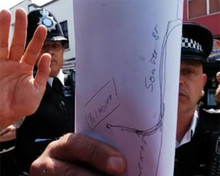
In an oral statement given in the House of Commons this afternoon, Theresa May outlined interim measures which would "not allow the continued use of Section 44 (...) in contravention of our civil liberties".
May's statement comes in response to the government's failed appeal at the European Court of Human Rights against a judgement which found the use of S44 against two press photographers breached their right to a private life.
Speaking to the House she said these new interim measures will "bring section 44 stop and search powers fully into line with the European Court's judgement".
"We have always been clear in our concerns about these powers and they will be included as part of our review of counter-terrorism legislation," she told MPs.
"I can therefore tell the House that I will not allow the continued use of section 44 in contravention of the European Court's ruling and, more importantly, in contravention of the civil liberties of every one of us. But neither will I leave the police without the powers they need to protect us.
"Since last Wednesday, I have sought urgent legal advice and consulted police forces. In order to comply with the judgement - but avoid pre-empting the review of counter-terrorism legislation - I have decided to introduce interim guidelines for the police."
The announcement comes as teenage photographer Jules Mattsson, whose detention by police last month under Section 44 while photographing a local cadet parade has sparked widespread debate online, was reportedly restricted from photographing a cadet parade again this week on Tuesday (6 July).
According to a tweet by Marc Vallée, co-founder of the I'm a Photographer Not a Terrorist! group, which has campaigned against the use of S44 measures against photographers, Mattsson was this time asked to stop photographing using the Section 43 powers.
But despite this, Olivier Laurent, news editor of The British Photography Journal claims says the new rules governing S44 are a significant step forward.
"This is a clear victory for photographers, but the Home Office must now make sure that police forces across the UK are aware of the change," he told Journalism.co.uk. "Also, let’s hope this decision will not lead to an increase in Section 43 stop-and-searches, for which police officers must have a reasonable suspicion that someone is a potential terrorist."
"Hopefully, these powers will not be abused," he added.
Police will now only be able to use section 44 in relation to the searches of vehicles.
She also announced a change to the test for authorisation of the use of S44 powers, from requiring a search to be 'expedient' for the prevention of terrorism, to the "stricter" test of it being 'necessary'.
May also introduced a new suspicion threshold: "Officers will no longer be able to search individuals using section 44 powers. Instead, they will have to rely on section 43 powers - which require officers to reasonably suspect the person to be a terrorist."
These interim measures will last until the government's review of counter-terrorism laws is completed.
Free daily newsletter
If you like our news and feature articles, you can sign up to receive our free daily (Mon-Fri) email newsletter (mobile friendly).
Related articles
- #JournalismMatters: The challenges of journalism in exile
- What to do if you are threatened with a SLAPP lawsuit
- WAN-IFRA: Five challenges to press freedom
- Economics woes affecting UK press freedom, RSF World Press Freedom Index finds
- Predictions for journalism 2024: misinformation, online safety and press freedom









